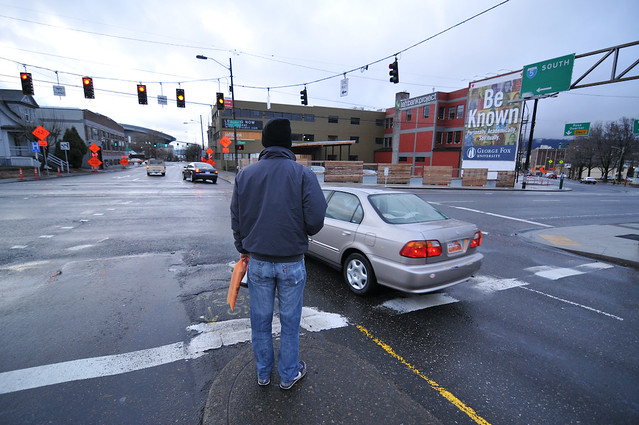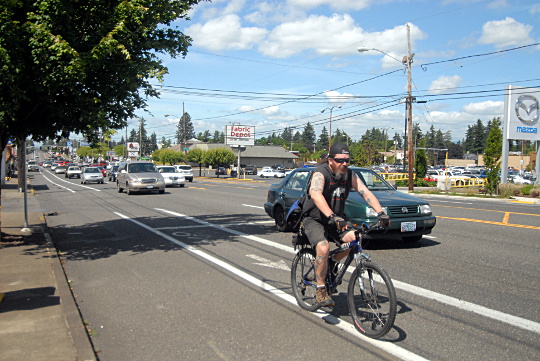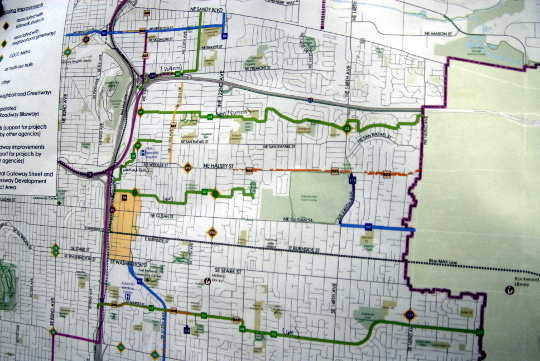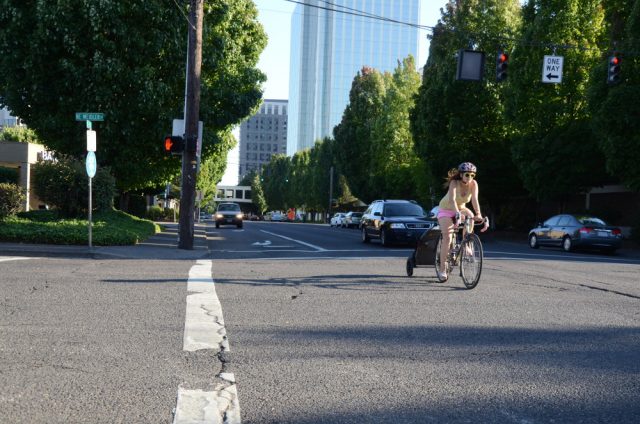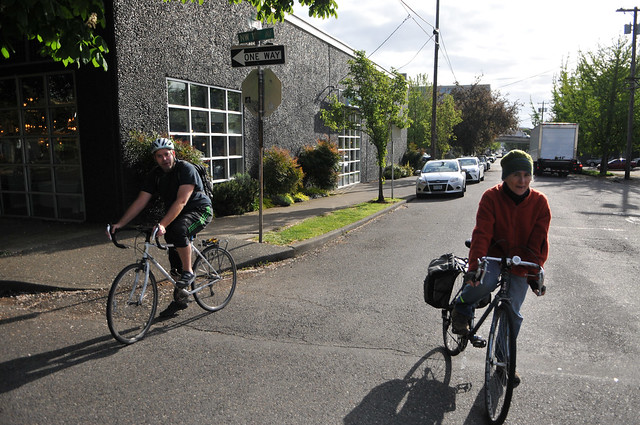Three years ago, before launching his long, awkward crusade to raise money for Portland streets, Transportation Commissioner Steve Novick made a really good point.
According to the city’s business tax records, he said, Portland residents, businesses and governments spend $844 million every year on auto maintenance and gasoline at local shops.
That’s not even close to the full cost of local auto use, which also includes buying cars, financing them, insuring them, parking them and so forth. Even without all that, it comes out to $3,270 per year per Portland household.
Almost everyone who bikes also drives, so almost everyone who bikes would pay. We should jump at the chance.
The 10-cent gas tax on the ballots that arrive this week in Portland mailboxes would very slightly increase that cost. Like the other costs of car use, this gas tax would be paid by rich Portlanders and by poor Portlanders. It would be paid — lest anyone forget — by Portlanders who bike, because the vast majority of Portlanders who use bikes also use cars.
It’d bring in $62 per Portland household per year, $5.18 per month. Per resident, the figure is $25, or $2.08 per month.
With that $62 per household, Portland would raise $16 million a year, or about one-fiftieth of the amount of money that Portlanders are already spending to fuel and repair their motor vehicles. Of that, $9 million go toward Portland’s budget for keeping its major streets from crumbling, increasing the paving budget by 64 percent. This would save taxpayers $90 million over the next 10 years because road maintenance now is far cheaper than repairs later. That’s a 1,000 percent return on investment — a $90 million payoff that Portland will be able to reinvest in making its streets better because it won’t have to throw every available penny into keeping them functional.
But that’s not all your $62 would do. It would also triple the city’s standing budget for new biking and walking infrastructure.
It would fill out a downtown protected bike lane network, finally delivering on the promise of our downtown bridge bikeways, all of which end before reaching the places people actually need to go.
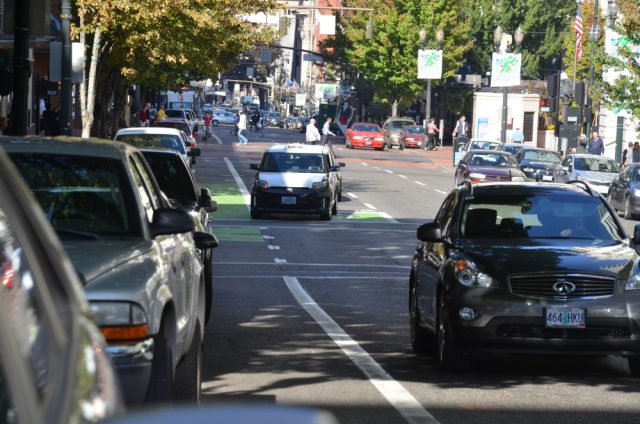
It would devote a similar amount of money to 122nd Avenue, the most important street in east Portland and the key to making low-car life in the area not just possible but pleasant.
It would build the Mill-Millmain-Main-Market and Holladay-Oregon-Pacific neighborhood greenways through east Portland, connecting David Douglas High School and thousands of new Portlanders to the I-205 path, Gateway Transit Center and the citywide bike network.
It would fund a 7th/9th neighborhood greenway, the crucial north-south connection to the Lloyd District, a first step in turning the Lloyd into the bike-friendliest dense neighborhood in the United States and an anchor for thousands of tomorrow’s pro-bike, pro-transit voters.
It would put a new neighborhood greenway on NW/SW 20th Avenue from Raleigh to Jefferson, connecting the fast-growing neighborhoods of the Northwest District with Goose Hollow, Portland State University and the employers in downtown and (via MAX) Washington County.
It would finally build the sidewalk on Southwest Capitol Highway from Multnomah Village to West Portland Town Center, a walking route to transit and shopping that has to be upgraded for southwest Portland to graduate from countryside to city.
Advertisement
Almost every day on BikePortland, we write about something the city could spend money on. This ballot issue is the best chance we’ve seen in 10 years to substantially increase the amount of money that goes toward making Portland a better place to ride a bicycle.
If a $5-per-month gas tax sounds expensive, an auto-dependent city is costing us much, much more.
The best argument against the gas tax — against spending $62 for each of the next four years to get everything above and more — is that it is regressive. Rich people drive much more than poor people, especially in cities like Portland, so they will pay more. But poor people who drive will still have to pay a disproportionate percentage of their income, just as they do with all gas taxes.
That’s why it is so essential that a gas tax also deliver disproportionate benefits to low-income Portlanders. The initiative on Portland ballots (unlike any conceivable statewide gas tax) does this. If it passes and if these projects are built, they will make driving significantly less necessary for Portlanders.
Yes, most Portlanders will still basically need to own a car. It’ll take many more years to change that, though the change is already underway. But these projects and the others funded by this tax will help many more Portlanders drive less. And less driving means fewer miles on car engines, fewer timing belt replacements, fewer fender-benders, fewer trips to the gas station.
Yes, $62 per year for the average household is regressive. But $3,270 per year for the average household is far, far more regressive. There is only one path to escaping it, and that is to make Portland a better place to get around without a car.
A “yes” vote wouldn’t be a gift from Portlanders to their city government, which regularly makes mistakes and will continue to. If it passes, it will be up to Portlanders (all of us on BikePortland included) to collect on the promise of this vote by making all these projects as good and smart as they can possibly be.
But without a “yes” vote on this ballot, most of these projects and the others that would follow them simply will not happen for many years to come.
A “yes” vote would be a gift from Portlanders to themselves. Let’s do this.
Ballots are due May 17 at 8 p.m.
— Michael Andersen, (503) 333-7824 – michael@bikeportland.org
— Jonathan Maus, (503) 706-8804 – jonathan@bikeportland.org
Our work is supported by subscribers. Please become one today.
Correction 2:30 pm: A previous version of this post gave the wrong annual spending figure for pavement maintenance.

